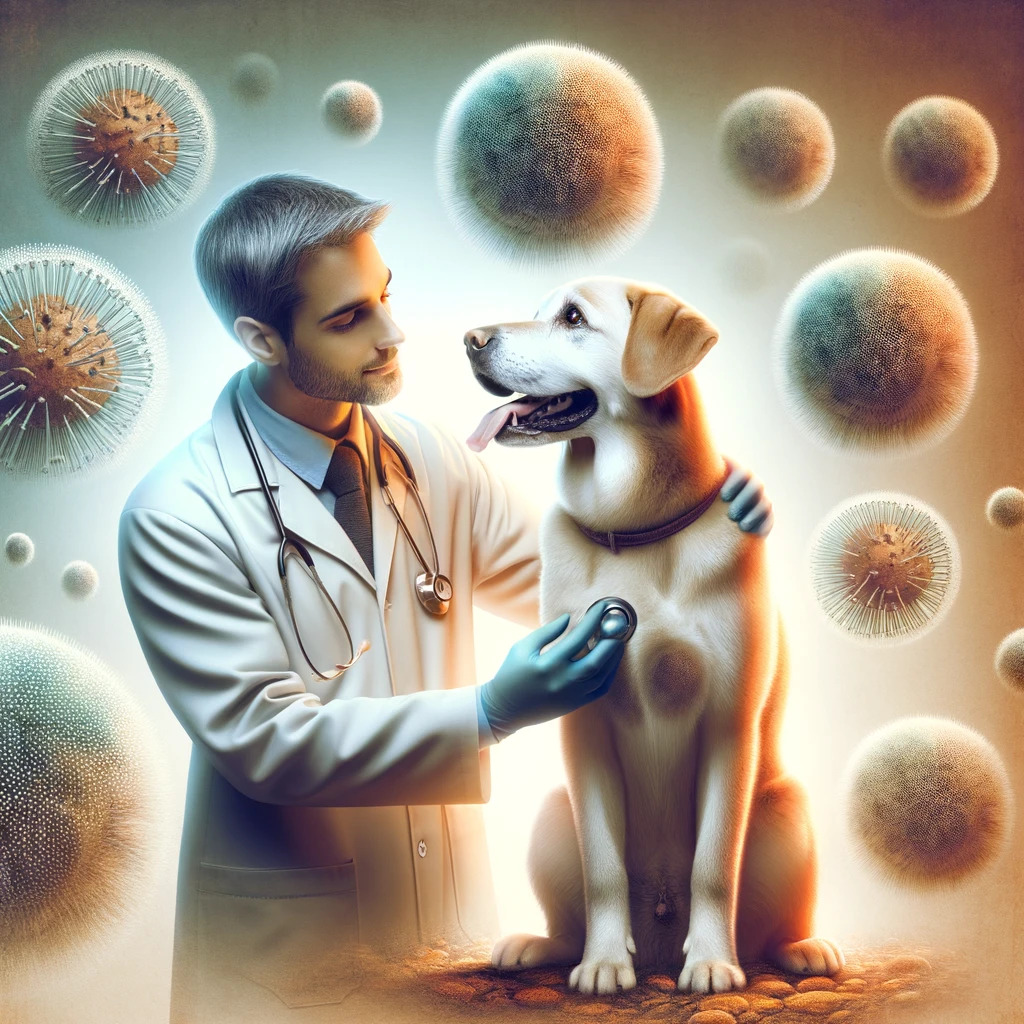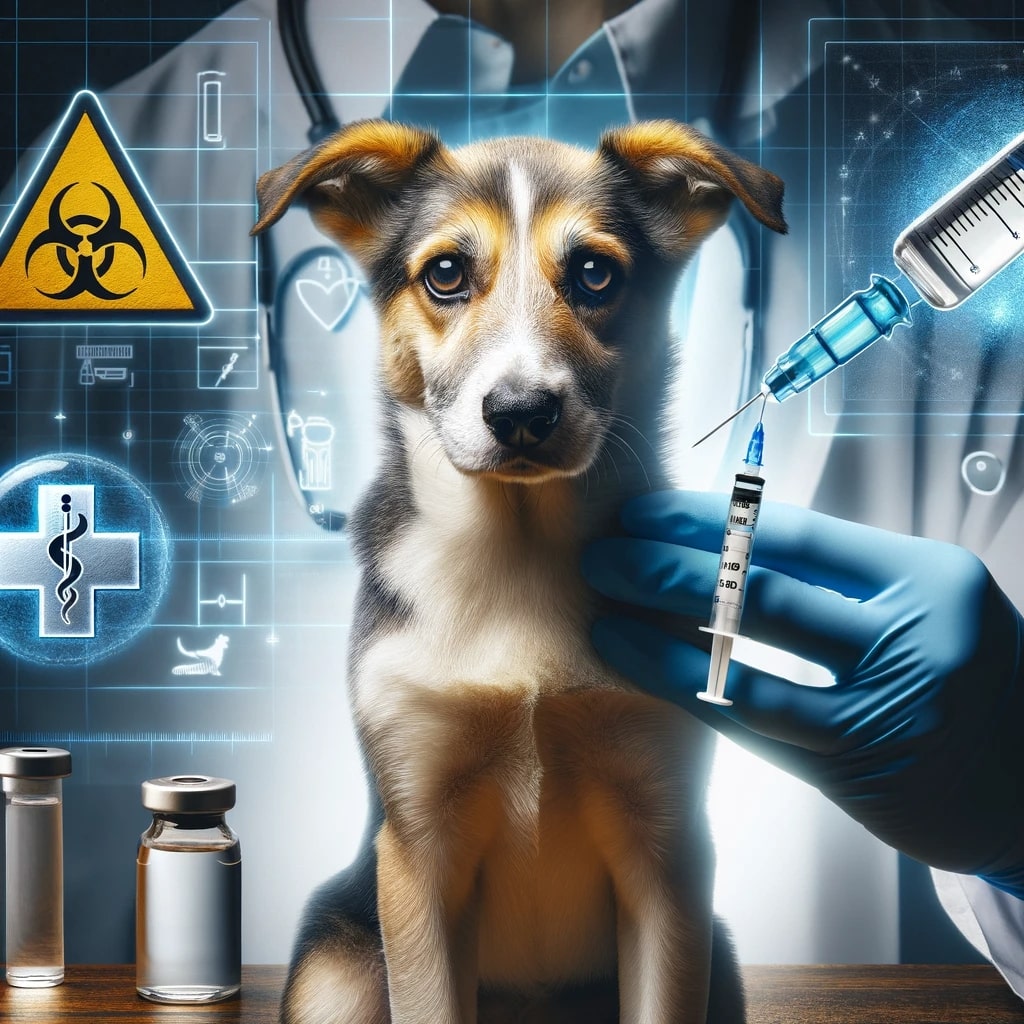Aspergillosis, a fungal infection that can affect dogs, often raises many questions among pet owners. This article aims to address the most commonly asked questions, providing detailed insights to help you understand and manage this condition in your furry friend.
What is Aspergillosis and How Does it Affect Dogs?
Aspergillosis is a fungal infection caused by the Aspergillus species, commonly found in the environment. It primarily affects a dog’s respiratory system but can also impact other parts of the body. This infection comes in two forms:
- Nasal Aspergillosis: Affects the nose and sinuses, more common in dogs with long snouts.
- Disseminated Aspergillosis: A more severe form that spreads throughout the body, often affecting the spine, bones, or organs.
Symptoms and Diagnosis
The symptoms of Aspergillosis in dogs vary based on the infection type:
- Nasal Aspergillosis symptoms include nasal discharge, nosebleeds, swelling, and pain around the nose.
- Disseminated Aspergillosis may cause fever, weight loss, lameness, and neurological issues.
Diagnosing Aspergillosis involves a combination of:
- Physical examination.
- Imaging tests like X-rays or MRI.
- Laboratory tests, including blood tests and nasal swab cultures.
Treatment Options
Treatment depends on the infection type:
- Nasal Aspergillosis is typically treated with antifungal medication, often administered through a nasal flush.
- Disseminated Aspergillosis requires more aggressive treatment, such as systemic antifungal drugs and supportive care.
Prevention and Management
Preventing Aspergillosis involves minimizing exposure to the fungus, typically found in decomposing vegetation and soil. Regular cleaning of your dog’s living environment can reduce the risk.
How is Aspergillosis in Dogs Diagnosed?
The diagnosis of Aspergillosis in dogs can be challenging due to its nonspecific symptoms. A multi-faceted approach is usually taken:
- Clinical History and Symptoms: Vets will first consider your dog’s clinical history and the presence of common symptoms.
- Physical Examination: A thorough physical exam, especially of the nasal area for nasal Aspergillosis.
- Imaging Tests: X-rays, MRI, or CT scans can help identify lesions in the nose or other affected areas.
- Laboratory Tests: These may include:
- Blood tests for overall health assessment.
- Nasal swab cultures to detect the presence of Aspergillus.
- Biopsy, if needed, for a definitive diagnosis.
- Endoscopy: Allows direct visualization of the nasal passages and is useful in both diagnosis and treatment.
Challenges in Diagnosis
- Aspergillosis symptoms can mimic other diseases, complicating diagnosis.
- The fungus is common in the environment, so its presence in tests doesn’t always confirm infection.
Advanced Diagnostic Techniques
In challenging cases, advanced techniques such as serological testing or PCR (Polymerase Chain Reaction) can detect specific antigens or DNA of the Aspergillus fungus.
What Are the Treatment Options for Aspergillosis in Dogs?
The treatment for Aspergillosis in dogs depends on the type of infection and its severity. Here’s a breakdown of the most common treatment methods:
- Antifungal Medication: The cornerstone of Aspergillosis treatment. These include drugs like itraconazole, fluconazole, and voriconazole.
- Nasal Aspergillosis Treatment:
- Topical Therapy: Antifungal medication is applied directly to the infected area via a nasal flush.
- Systemic Therapy: Oral antifungal medications.
- Surgery: In some cases, to remove fungal masses.
- Disseminated Aspergillosis Treatment:
- Aggressive Antifungal Therapy: Often requires a combination of drugs.
- Supportive Care: Including pain management and nutritional support.
- Regular Monitoring: Frequent check-ups and blood tests.
- Duration of Treatment: Can be lengthy, often several months.
- Follow-Up: Regular follow-up is crucial to monitor the effectiveness of treatment and adjust as necessary.
Treatment Challenges
- Aspergillosis can be resistant to treatment, especially the disseminated form.
- Long-term medication can have side effects.
Prognosis
- The prognosis is generally good for nasal Aspergillosis if treated early.
- Disseminated Aspergillosis has a more guarded prognosis due to its severity.
Can Aspergillosis in Dogs Be Prevented?
While it’s challenging to completely prevent Aspergillosis due to the widespread nature of the fungus, there are steps to reduce the risk:
- Environmental Hygiene: Regular cleaning of your dog’s living areas to reduce exposure to the fungus.
- Avoid High-Risk Areas: Limiting exposure to places with high concentrations of organic debris, like compost heaps or heavily wooded areas.
- Strengthening Immune System: Ensuring your dog has a balanced diet and regular exercise can help boost their immune system.
- Regular Vet Check-Ups: Early detection of any health issues.
- Awareness: Being aware of the symptoms of Aspergillosis can lead to earlier diagnosis and treatment.
Additional Considerations
- Dogs with weakened immune systems are more susceptible.
- There’s no vaccine against Aspergillosis.
Role of Breed and Age
- Certain breeds and older dogs may be more at risk.
What Are the Long-Term Effects of Aspergillosis on Dogs?
Understanding the long-term effects of Aspergillosis is crucial for managing your dog’s health:
- Chronic Nasal Issues: In cases of nasal Aspergillosis, chronic nasal discharge or discomfort might persist.
- Recurrence: There’s a possibility of recurrence, requiring ongoing monitoring.
- Damage to Affected Areas: Depending on the severity, there can be lasting damage to the nasal passages or other affected areas.
- Systemic Health Issues: In disseminated cases, other organs might be affected long-term.
- Quality of Life: Chronic cases may impact your dog’s quality of life.
Management of Long-Term Effects
- Regular veterinary care and follow-up.
- Adjustments in lifestyle or medication.
Psychological Impact
- Chronic illness can affect a dog’s behavior and mood.
Are Certain Dog Breeds More Susceptible to Aspergillosis?
Aspergillosis can affect any dog, but some breeds may have a higher susceptibility. Understanding this can help in early detection and prevention:
- Breed Susceptibility:
- Long-nosed breeds (like German Shepherds and Retrievers) are more prone to nasal Aspergillosis.
- No specific breed predisposition for disseminated Aspergillosis.
- Anatomical Factors:
- The structure of the nasal passages in long-nosed breeds may make them more susceptible.
- Genetic Factors:
- Research is ongoing to determine if genetics play a role in susceptibility.
- Immune System Strength:
- Breeds with known immune deficiencies might be at higher risk.
Importance of Breed Awareness
- Knowing the risks can help in early diagnosis and treatment.
Other Risk Factors
- Age and overall health also contribute to susceptibility.
What Are the Symptoms of Aspergillosis in Dogs?
Recognizing the symptoms of Aspergillosis is crucial for early treatment. Symptoms vary based on the type of Aspergillosis:
- Nasal Aspergillosis Symptoms:
- Nasal discharge (often bloody).
- Sneezing and nasal pain.
- Swelling or deformity of the nose.
- Reduced appetite.
- Disseminated Aspergillosis Symptoms:
- Fever and lethargy.
- Weight loss and loss of appetite.
- Lameness or joint pain.
- Neurological symptoms in severe cases.
- Symptom Severity:
- Symptoms can range from mild to severe.
- Progression of Symptoms:
- Symptoms may worsen over time without treatment.
Monitoring and Action
- Regular monitoring for these symptoms is vital.
- Immediate veterinary consultation is recommended if symptoms are observed.
How Does the Environment Affect the Risk of Aspergillosis in Dogs?
The environment plays a significant role in the risk of Aspergillosis in dogs, as the fungus thrives in certain conditions:
- Common Environments for Aspergillus:
- Compost piles, decaying vegetation, and damp areas.
- Indoor environments with poor air quality.
- Seasonal Variations:
- Higher risk during damp and humid conditions.
- Preventive Measures:
- Avoid letting dogs dig or spend time in high-risk areas.
- Maintain clean, dry, and well-ventilated living spaces.
- Geographical Variations:
- Some areas may have a higher concentration of the fungus.
Environmental Awareness
- Being aware of your local environment can help in taking preventive steps.
Impact of Human Activities
- Activities like gardening or indoor mold growth can increase risk.
How is Aspergillosis in Dogs Treated and Managed?
Effective treatment and management of Aspergillosis in dogs are key to their recovery and quality of life. Here’s an overview of the treatment and management strategies:
- Initial Treatment:
- Antifungal medications (itraconazole, voriconazole, etc.).
- Nasal flush with antifungal agents for nasal Aspergillosis.
- Ongoing Management:
- Regular monitoring of response to treatment.
- Adjustments in medication based on progress.
- Surgical Intervention:
- In some severe cases, surgery might be needed to remove fungal masses.
- Supportive Care:
- Nutritional support and pain management.
- Ensuring a stress-free environment for recovery.
- Follow-up and Monitoring:
- Regular veterinary check-ups.
- Blood tests to monitor liver function (due to medication side effects).
Managing Side Effects
- Monitoring for any side effects of long-term antifungal use.
Recurrence Prevention
- Strategies to minimize exposure to the fungus.
- Continued monitoring for symptoms even after recovery.
What Research is Being Done on Aspergillosis in Dogs?
Ongoing research is crucial for advancing the understanding and treatment of Aspergillosis in dogs. Current research focuses include:
- New Treatment Modalities:
- Investigating more effective and less toxic antifungal drugs.
- Research on vaccine development against Aspergillosis.
- Diagnostic Improvements:
- Developing more accurate and less invasive diagnostic tests.
- Understanding Fungal Behavior:
- Studies on how Aspergillus species infect and affect dogs.
- Genetic Research:
- Investigating genetic factors that might influence susceptibility.
- Epidemiological Studies:
- Research on the prevalence and environmental risk factors.
Importance of Research
- Advances in research can lead to better prevention, diagnosis, and treatment.
Collaboration
- Collaboration between veterinarians, researchers, and universities.
How Can Pet Owners Support Dogs with Aspergillosis?
Pet owner support is crucial for the successful treatment and recovery of dogs with Aspergillosis. Here are ways to provide this support:
- Adhering to Treatment Plans:
- Following the veterinarian’s instructions for medication and care.
- Regular Veterinary Visits:
- Ensuring consistent follow-up appointments.
- Home Care:
- Providing a comfortable, clean, and stress-free environment.
- Monitoring for any changes or worsening of symptoms.
- Nutritional Support:
- Offering a balanced diet to support their immune system.
- Emotional Support:
- Providing comfort and reassurance to your dog during treatment.
Understanding the Condition
- Educating yourself about Aspergillosis to better understand and manage it.
Joining Support Groups
- Connecting with other pet owners facing similar challenges.
What Are the Latest Advances in Treating Canine Aspergillosis?
Staying informed about the latest advances in treating canine Aspergillosis can help pet owners make informed decisions about their dog’s health. Here are some of the notable recent developments:
- New Antifungal Medications:
- Research into more effective and less toxic drugs.
- Trials for newer antifungals with fewer side effects.
- Improved Diagnostic Techniques:
- Development of more accurate and faster testing methods.
- Use of advanced imaging technologies for better diagnosis.
- Vaccine Research:
- Efforts towards developing a vaccine against Aspergillus infection.
- Targeted Therapies:
- Exploration of therapies targeting specific fungal components.
- Holistic Treatment Approaches:
- Integrating traditional treatments with supportive therapies like diet and supplements.
Impact on Treatment
- These advances can lead to more effective and less invasive treatments.
Keeping Up-To-Date
- Regular consultation with veterinarians about new treatment options.
What Complications Can Arise from Aspergillosis in Dogs?
Understanding potential complications of Aspergillosis in dogs is important for early intervention and management. Here are common complications:
- Chronic Nasal Infection:
- Persistent infection leading to ongoing nasal issues.
- Spread of Infection:
- In disseminated Aspergillosis, the fungus can spread to various organs.
- Resistance to Treatment:
- The fungus may become resistant to standard antifungal treatments.
- Side Effects of Medication:
- Long-term use of antifungals can lead to liver or kidney issues.
- Recurrence:
- Possibility of the infection returning after treatment.
Managing Complications
- Close monitoring and regular veterinary check-ups.
- Adjustments in treatment plans as needed.
Importance of Early Detection
- Early detection can help prevent or minimize complications.
How Can Aspergillosis Impact a Dog’s Quality of Life?
Aspergillosis can significantly impact a dog’s quality of life, especially if not promptly and effectively treated. Here’s how:
- Physical Discomfort:
- Symptoms like nasal discharge and pain can cause discomfort.
- Behavioral Changes:
- Chronic illness can lead to changes in behavior, such as increased lethargy or irritability.
- Activity Limitations:
- Some dogs may become less active due to pain or discomfort.
- Dietary Issues:
- Loss of appetite or dietary restrictions can affect their nutrition.
- Emotional Impact:
- Chronic illness can affect a dog’s overall mood and happiness.
Supporting Quality of Life
- Providing a comfortable and supportive home environment.
- Regular engagement and gentle exercise as appropriate.
Emotional Support
- Offering extra affection and reassurance to your pet.
What Role Does Nutrition Play in Managing Aspergillosis in Dogs?
Proper nutrition is a key component in managing Aspergillosis in dogs. It can support their immune system and overall health during treatment. Here are important aspects to consider:
- Balanced Diet:
- Providing a well-balanced diet rich in essential nutrients.
- Considering special diets if recommended by a veterinarian.
- Immune System Support:
- Foods that boost the immune system can be beneficial.
- Supplements like omega-3 fatty acids, antioxidants, and vitamins may be recommended.
- Hydration:
- Ensuring adequate water intake to help flush out toxins.
- Avoiding Certain Foods:
- Some foods might exacerbate symptoms or interact with medications.
- Specialized Nutrition Plans:
- In some cases, a veterinarian might recommend a specialized diet.
Consulting a Veterinarian
- Always consult with a vet before making dietary changes.
Monitoring and Adjustments
- Regular monitoring of the dog’s response to the diet and making adjustments as needed.
What Support Resources Are Available for Owners of Dogs with Aspergillosis?
Dealing with a dog’s illness can be challenging for owners. Knowing the available support resources can be immensely helpful. Here are some resources to consider:
- Veterinary Support:
- Regular consultations and follow-ups with your vet.
- Online Communities:
- Forums and social media groups where experiences and advice are shared.
- Educational Materials:
- Books, websites, and pamphlets about Aspergillosis in dogs.
- Support Groups:
- Local or online support groups for pet owners dealing with similar issues.
- Professional Counseling:
- Seeking professional help if dealing with the emotional impact.
Leveraging Resources
- Utilizing these resources for information, support, and guidance.
Emotional Support
- Recognizing the importance of emotional support for both the dog and the owner.
Are There Alternative Therapies for Treating Aspergillosis in Dogs?
While traditional medical treatments are primary, some pet owners explore alternative therapies for Aspergillosis. Here’s an overview:
- Herbal Remedies:
- Certain herbs are believed to have antifungal properties.
- Acupuncture:
- Used for pain management and to improve immune function.
- Homeopathy:
- Some owners opt for homeopathic treatments in conjunction with traditional medicine.
- Dietary Supplements:
- Supplements that support immune health may be considered.
- Physical Therapy:
- Especially for dogs recovering from disseminated Aspergillosis.
Caution with Alternative Therapies
- Always consult with a veterinarian before starting any alternative treatments.
Complementary Approach
- These therapies are often used in conjunction with, not as a replacement for, traditional medical treatment.
Debunking Common Myths About Canine Aspergillosis
Misinformation can lead to confusion and anxiety for dog owners. Here, we address some common myths and answer frequently asked questions about Aspergillosis in dogs:
Common Myths Debunked
- Myth: Aspergillosis is Contagious Among Dogs:
- Fact: Aspergillosis is not contagious and is contracted from the environment.
- Myth: Only Older Dogs Get Aspergillosis:
- Fact: Dogs of any age can get Aspergillosis, although certain factors like immune status can play a role.
- Myth: Aspergillosis is Always Fatal:
- Fact: With proper treatment, many dogs recover from Aspergillosis, especially in the case of nasal Aspergillosis.
Summary Table
| Topic | Key Points |
| What is Aspergillosis | Fungal infection caused by Aspergillus; affects respiratory system and other parts of the body. |
| Symptoms | Nasal discharge, nosebleeds, swelling around the nose, fever, weight loss, lameness, neurological issues. |
| Diagnosis | Clinical history, physical examination, imaging tests, laboratory tests, endoscopy. |
| Treatment | Antifungal medication, nasal flush (for nasal Aspergillosis), surgery in severe cases, supportive care. |
| Prevention | Minimizing exposure to fungus, environmental hygiene, strengthening the immune system. |
| Long-Term Effects | Chronic nasal issues, possible recurrence, damage to affected areas, systemic health issues. |
| Breed Susceptibility | Long-nosed breeds more prone to nasal Aspergillosis; no specific breed predisposition for disseminated Aspergillosis. |
| Environmental Impact | Fungus thrives in compost piles, decaying vegetation, damp areas; risk varies with seasons and geography. |
| Nutritional Management | Balanced diet, immune system support, hydration, avoiding certain foods. |
| Support Resources | Veterinary support, online communities, educational materials, support groups, professional counseling. |
| Alternative Therapies | Herbal remedies, acupuncture, homeopathy, dietary supplements, physical therapy. |
| Research Advances | New antifungal medications, improved diagnostic techniques, vaccine research, targeted therapies. |
| Complications | Chronic infection, spread of infection, resistance to treatment, medication side effects, recurrence. |
| Quality of Life Impact | Physical discomfort, behavioral changes, activity limitations, dietary issues, emotional impact. |
Frequently Asked Questions
Yes, particularly disseminated Aspergillosis can affect various organs and lead to more severe health issues.
Treatment duration varies but can often last several months, depending on the severity and response to treatment.
Aspergillosis is not contagious between animals; it’s safe to have other pets.
Aspergillosis is not typically transmitted from dogs to humans.
Improvement in symptoms, such as reduced nasal discharge and increased energy levels, can indicate recovery.
The success rate is generally high for nasal Aspergillosis with timely and appropriate treatment; disseminated Aspergillosis has a more variable outcome.
There is a possibility of recurrence, especially if the underlying conditions are not addressed.
Conclusion
In conclusion, Aspergillosis in dogs is a serious condition but with proper diagnosis, treatment, and care, many dogs can lead healthy lives post-recovery. Understanding the disease, its symptoms, and treatment options are crucial for dog owners. Regular veterinary check-ups, a supportive environment, and good nutrition play significant roles in managing this condition. Ongoing research and advances in veterinary medicine continue to improve the outcomes for dogs affected by Aspergillosis.



